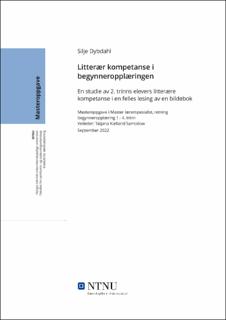| dc.contributor.advisor | Samoilow, Tatjana Kielland | |
| dc.contributor.author | Dybdahl, Silje | |
| dc.date.accessioned | 2022-10-22T17:19:35Z | |
| dc.date.available | 2022-10-22T17:19:35Z | |
| dc.date.issued | 2022 | |
| dc.identifier | no.ntnu:inspera:118957862:50885471 | |
| dc.identifier.uri | https://hdl.handle.net/11250/3027662 | |
| dc.description.abstract | Sammendrag
I denne masteroppgaven har jeg ønsket å finne ut hvilken litterær kompetanse elever i begynneropplæringen har. I Læreplanen for Kunnskapsløftet 2020 er lesing av skjønnlitteratur løftet frem som et grunnleggende og avgjørende element i elevenes skolegang. For å gi mening til skjønnlitterære tekster, trenger vi litterær kompetanse. For å vite hvordan vi skal legge opp til best mulig undervisning for våre elever, er det avgjørende at vi vet hvilken kunnskap de allerede har.
Studiens problemstilling har vært:
Hvordan kommer barns litterære kompetanse til syne gjennom en litterær samtale om en bildebok?
For å finne svar på problemstillingen har jeg gjennomført en kvalitativ studie med følgende forskningsspørsmål som utgangspunkt:
-Hvilke kunnskaper om bildebokas konvensjoner viser elevene?
-Hvordan forstår og tolker elevene fortellingen?
Kunnskapsgrunnlaget for oppgaven bygger på blant annet Torell (2001), Steffensen (2005), Culler (2011) og Nikolajeva (2010) sin forståelse av begrepet litterær kompetanse. Bildebokteori er også sentralt i oppgaven, siden studien bygger på en litterær samtale om en bildebok. I denne sammenhengen støtter jeg meg til Rhedin (1992), Nikolajeva og Scott (2006) og Nikolajeva (2000, 2010b).
Elevenes litterære kompetanse er forsøkt kartlagt gjennom en litterær samtale. Studien viser at elever på 2. trinn har mye kunnskap om bildebøker, og at denne kunnskapen bidrar til deres tolkning og forståelse av boka. Den viser at elevene deltar aktivt i lesingen, og at de formidler sine kunnskaper og ferdigheter gjennom verbalspråket og andre nonverbale ressurser. Deler av elevenes kunnskap kommer til uttrykk gjennom måten de bruker boka på under lesingen. Elevene mestrer ikke alltid å uttrykke eksplisitt hva de tenker og hvordan de opplever boka, men gjennom spørsmål, forklaringer og meningsutveksling elevene imellom, blir kunnskapen synlig, samtidig som den videreutvikles.
Likt andre studier viser også min studie at elever på dette trinnet er avhengig av en stødig og tydelig lærer som kan hjelpe dem i lesingen av og i samtalen om boka (Håland & Hoel, 2016; Ottesen & Tysvær, 2020), for at de skal mestre å utvikle sin litterære kompetanse best mulig. | |
| dc.description.abstract | Abstract
In this master thesis I wanted to find out which literary competence the youngest pupils at school hold. In Læreplanen for Kunnskapsløftet 2020 reading fiction is mentioned as one of the basic and decisive skills pupils must learn during their time at primary school. To understand fiction, we need literary competence. We want to give our pupils the best teaching possible. To do so we need knowledge of which competence they already hold.
The thesis has the following research problem:
How does children show their literary competence in a literary conversation about picture books?
To find answers to this research problem, I have conducted a qualitative study based on the following research questions:
-Which knowledge of picture books conventions do the pupils show?
-How do the pupils interpret and understand the story?
This thesis is based on Torell (2001), Steffensen (2005), Culler (2011) and Nikolajevas (2010) understanding of the concept literary competence, among others. Picture book theory is an important part of this thesis, since this study is based on reading and talking about a picture book. In this context I find my support in theories by Rhedin (1992), Nikolajeva and Scott (2006) and Nikolajeva (2000, 2010b).
Using a literary conversation, I try to reveal which literary competence the pupils hold. The study shows that 2nd graders have developed knowledge about picture books, and that this knowledge helps them to interpret and understand the book. It shows that the pupils actively participate in the reading of the book and that they show their knowledge through verbal language and non- verbal communication. Parts of the pupils’ knowledge are expressed through the way they use the book during reading. The pupils still lack the language to talk explicitly about their thoughts and how they experience the book. Through questions, explanations, and the pupils’ exchange of views, their knowledge becomes visible and develops.
Like other studies, my study also shows that pupils at this age need a teacher who can help them to talk about the book in a constructive and meaningful manner (Håland & Hoel, 2016; Ottesen & Tysvær, 2020). Then they will manage to develop their literary competence in the best way possible. | |
| dc.language | nob | |
| dc.publisher | NTNU | |
| dc.title | Litterær kompetanse i begynneropplæringen | |
| dc.type | Master thesis | |
